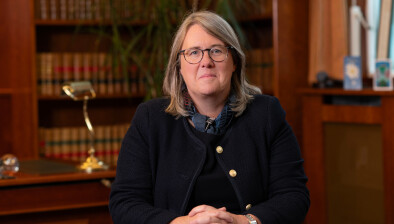NI High Court: Judge upholds parental rights of father despite sexual offences against daughter’s mother

Northern Ireland’s High Court has dismissed an application to strip away a father’s parental responsibility towards his daughter despite evidence of domestic and sexual abuse towards her mother in the child’s presence.

About this case:
- Citation:[2021] NIFam 36
- Judgment:
- Court:NI High Court
- Judge:Mr Justice David McFarland
An application was brought by the child, RE’s, mother under Article 7 (3A) of the Children (NI) Order 1995 to order that the father should cease to bear parental responsibility for their child. She sought the order due to a previous offence committed against her by the father.
The mother believed that any requirement that the father receive information, and for him to be involved in decision-making, about RE would re-traumatise her. She was living at a confidential address and feared that any information about RE could reveal that address. She also feared a random meeting with the father, which had occurred previously. She also referred to drug misuse and general controlling behaviour on the part of the father.
Mr Justice David McFarland ultimately dismissed her application as not being in the best interests of the child. However, he did make orders restricting the father’s access to the child for one year.
Background
RE was born in 2016, and although the mother and father were not married, the father was registered on RE’s birth certificate, meaning that he acquired parental responsibility for her. Under Article 6, parental responsibility is defined as “all the rights, duties, powers, responsibilities and authority which by law a parent of a child has in relation to the child and his property”.
The mother and father lived together as a couple since 2014. In September 2016, there was a “serious incident” when RE was four months old and the mother was eight weeks pregnant with the couple’s second child. As a result of this, the father was not named on the birth certificate of the second child and does not have parental responsibility for that child.
In January 2018, the father pleaded guilty at Dungannon Crown Court to offences of causing the mother to engage in sexual activity and a common assault on her. These offences occurred in a single incident, in the couple’s bedroom, in the presence of RE. He had faced more serious charges including false imprisonment and rape.
The judge noted that “whilst it is difficult to understand the rationale behind the convictions it is clear that the pleas were entered on the basis of a compromise with the prosecution. The events involved non-consensual activity and sexual penetration and the sentence of four years (two years custodial term and two years licence) is more on a par with a rape conviction”.
A Sexual Offences Prevention Order (SOPO) was also imposed until 24 January 2025. This prevents contact with the mother, save for indirect contact during family court proceedings, in relation to RE and the couple’s other child.
Notification requirements under the Sexual Offences Act 2003 also apply to the father for an indefinite period. The father remained in prison until 14 February 2019. His licence period expired on 14 February 2021.
Law
The court considered Re DD [2019] NI Fam 17, where McAlinden J set out the four broad situations when the court can consider applications of this type:
- cases involving the sexual assault of the child or sibling,
- cases involving the inflicting of serious injuries to the child or sibling,
- cases involving domestic abuse of the parent of the child; and
- cases involving significant criminal behaviour to others outside the family.
This case fell into the third category.
The judge also stressed that parental responsibility does not equate to parentage. Removal of parental responsibility does not remove parentage and it does not prevent a parent from applying for, and having contact with, a child.
The hearing was conducted on 6 September 2021 and proceeded by way of submissions only. Both parents made statements but no oral evidence was received.
Arguments
The mother’s case relied primarily on the severity of the sexual and physical assault against her in September 2016. She also raised the issue of risk of harm to both children.
The court accepted that if she was to share parental responsibility, it would require contact and discussions with the father when dealing with issues such as medical care, schooling and other matters. She stated that she is “terrified” of the father, and during a previous encounter with him she “was so disturbed to the point of bladder incontinence”.
However, the court was wary to accept “self-reported” and uncorroborated evidence. Further, the court stressed that there was no confirmation of any diagnosis concerning her mental health, and when her GP was asked to provide a report, he declined, stating that he lacked the expertise.
The mother’s social worker “felt that [the mother’s] symptoms were indicative of Post-Traumatic Stress Disorder”, but the judge was uncertain as to whether the social worker was qualified to make such a diagnosis.
The father, on the other hand, argued that the mother’s entire application was “tactical”, and asserted that he had a “responsible attitude towards both children and the mother”, as indicated through his decision to withdraw his applications for contact with the children.
He stated that he is “remorseful” for his past conduct and he has served his punishment, which included a period on licence when he did not come to any adverse attention of the Probation Board or others.
Final determination
The judge stressed that the court will always approach decisions such as this bearing in mind the paramountcy of the welfare of RE. As this was the mother’s application, the burden was on her to show, on the balance of probabilities, that parental responsibility should be removed.
Further, the judge relied on Re M [1995] Lexis Citation 1203, which emphasised that parental responsibility should not be removed unless there is a good reason.
The judge also considered Re A [2013] EWHC 2963, a case with similar facts, involving proven coercive control, with convictions for two physical assaults on the mother over several years, the latter being witnessed by the couple’s four-year-old daughter. Here, the court did terminate the father’s parental responsibility. However, in that case, the father did not appear and was not represented, having previously indicated a willingness to give up parental responsibility, albeit without a formal document to that end.
In the circumstances, Mr Justice McFarland was not satisfied that the mother had shown it was proportionate to terminate the father’s parental responsibility for the child. Her application was therefore dismissed.
Conclusion
The judge made a prohibited steps order under Article 8 prohibiting the father from taking any steps in the exercise of any aspect of his parental responsibility for the child for a period of one year.
A further order under Article 179(14) was made, stating that the father shall not make an application under the 1995 Order in respect of the child without the leave of the court, again for a period of one year.
Both periods are to run until 15 September 2022.











